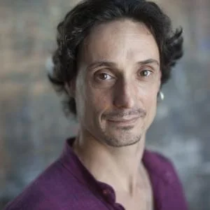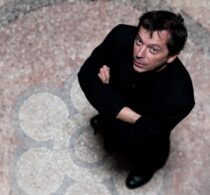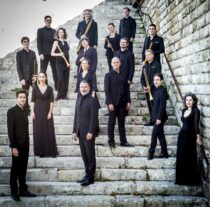Vancouver Playhouse
Doulce Mémoire: Now, Let Us Dance!
The Art of Dance in the Fifteenth & Sixteenth Centuries
Artists: Hubert Hazebroucq, dance; Ensemble Doulce Mémoire directed by Denis Raisin Dadre
Highly stylised, formal and solemn: this is how we generally imagine early dances. But this concert dansé, featuring the wonderful dancer and choreographer Hubert Hazebroucq, will show you what dances were really like in the fifteenth and sixteenth centuries! Omnipresent at court festivities, they were elegant, refined and aristocratic, becoming spectacular, virtuosic, theatrical, and allegorical when performed in the sumptuous intermèdes of princely celebrations.
The dances will be accompanied by a wind band, the “piffari”, with instrumentalists who can switch with ease from hauts (“loud”) instruments, such as shawms and oboes, to bas (“soft”) instruments, including flutes and bassoons.
Generously sponsored by Vincent and Zelie Tan & Elaine Stevens.

Hubert Hazebroucq, choreographer & dancer
Originally trained in classical and contemporary dance in Lyon, Hubert Hazebroucq soon turned to working with contemporary dance companies, including (2002-2007) the Compagnie Kilina Crémona. He began to specialise in Renaissance and Baroque dances in 1998, in particular with L’Éclat des Muses, a company directed by Christine Bayle (Paris), working on the comédie-ballet and ballet de cour repertoires (including the Ballet de la Merlaison in 2011). He learned the gestures of Baroque theatre, and trained in Italian Renaissance dance styles with Barbara Sparti. He also appears with several other companies specialising in historical dance, including Lieven Bart, JMB Co., Fancy Baroque, and Divertimenty.
Hubert Hazebroucq, who holds Masters degrees in French literature and in Musicology, is a board member of the Association for a Research Centre on the Performing Arts in the Seventeenth and Eighteenth Centuries; he also takes part in several research programmes as an independent researcher, and is involved in numerous international symposia (Le Corps en scène, Versailles / Nantes 2009; Symposium on French Gesture, Utrecht, 2010; Cesar Seminar, ‘Theatre as visual spectacle’, Oxford, 2011; etc.) He has received Dance Research and Heritage Grants from the Centre National de la Danse.
In 2008 Hubert Hazebroucq became director of the company Les Corps Éloquents and began personal research on the basse danse, ‘old measures’, and the theatrical repertoire of the early eighteenth century. He choreographs for several ensembles, including Artémis, Le Jardin des Délices and La Compagnie de l’Aune.
Hubert Hazebroucq is a fully qualified teacher of contemporary dance and (since 2000) Renaissance and Baroque dance.

Denis Raisin Dadre, artistic director
After his musical studies – recorder, oboe and musicology – Denis Raisin Dadre formed the ensemble Doulce Mémoire in 1989, with the aim of presenting music of the Renaissance period. His keen interest in history, literature, and the arts in general, as well as music, leads him to devise programmes set in a historical context and he uses the same approach to produce programmes for radio (France Musique).
After twenty-five years of intense activity, with memorable achievements both in concert and on CD, Denis Raisin Dadre’s love for the Renaissance has never declined. While studying the material found in European libraries, transposing manuscript scores or trying out various instrumental possibilities, he questions preconceived ideas and sometimes even the vocabulary of music – and not only that of the Renaissance, for he often works with stage directors and choreographers on the creation of original types of performance. Denis Raisin Dadre appears with his ensemble Doulce Mémoire at major venues in France and all over the world – at the Théâtre de Chaillot (Paris), Montpellier Opéra, the Villa Medici in Rome, the Santiago Opera House in Chile, the Utrecht, Hong Kong, Boston and Bergen festivals, and so on.
He is regularly invited to take part in academies organised for the training of young musicians. Denis Raisin Dadre has taught at those of Gijon (Spain), Chiquitos (Bolivia), Prague (Czech Republic) and Havana (Cuba). He is also a member of the teaching staff of the Department of Early Music at the Tours Conservatoire. Denis Raisin Dadre was made a Chevalier des Arts et des Lettres by the French Ministry of Culture in 1999.

Ensemble Doulce Mémoire
Doulce Mémoire represents above all the spirit of the XVIth century Renaissance – a time of voyages and discovery, inventiveness and creativity. For more than thirty years now, this faithful, knitted team of musicians and singers has been involved in artistic ventures of a constantly innovative nature, with the regular participation of actors and dancers. The ensemble’s productions range from the highly colourful ceremony in Spanish cathedrals « Renaissance splendours » to the stage show Royal festivities at theFrench court, a joyful evocation in music, singing and dancing of a celebration att he court of France.
Since it was founded, Doulce Mémoire has appeared at national theatres, opera houses and festivals all over France, as well as in many major cities abroad (New York, Hong Kong, Riga, Bruxelles, Rome, Mexico, Séoul, Brasilia, Singapour etc) or emblematic monuments (Châteaux de Chambord and Versailles, Louvre Museum, Mont Saint-Michel, Sevilla cathedral…). Always game for new challenges, the ensemble has also performed at more unusual venues: in front of a UGC cinema in the heart of Paris, for instance, and at the prestigious National Museum of Taipei; in the grounds of the Sultans’ Palace in Istanbul, or precariously balanced on a barge in the Tahiti lagoon. Through its concerts and shows, Doulce Mémoire enables audiences to discover the music that could have been heard by great men of the Renaissance such as Leonardo da Vinci, Michelangelo, Rabelais, François I and others, some of whom left their mark on the French Loire Valley and some of its fine Renaissance châteaux.
For the past thirty years the ensemble has been particularly active in Centre-Loire Valley Region of France, with which it has developed a privileged relationship especially with the royal château at Chambord. Doulce Mémoire records for Alpha Classics-Outhere, Ricercar and le label Printemps des Arts de Monte Carlo and regularly receives top ratings in the specialised music press. The ensemble has taken part in several documentaries for the cultural TV channel.


